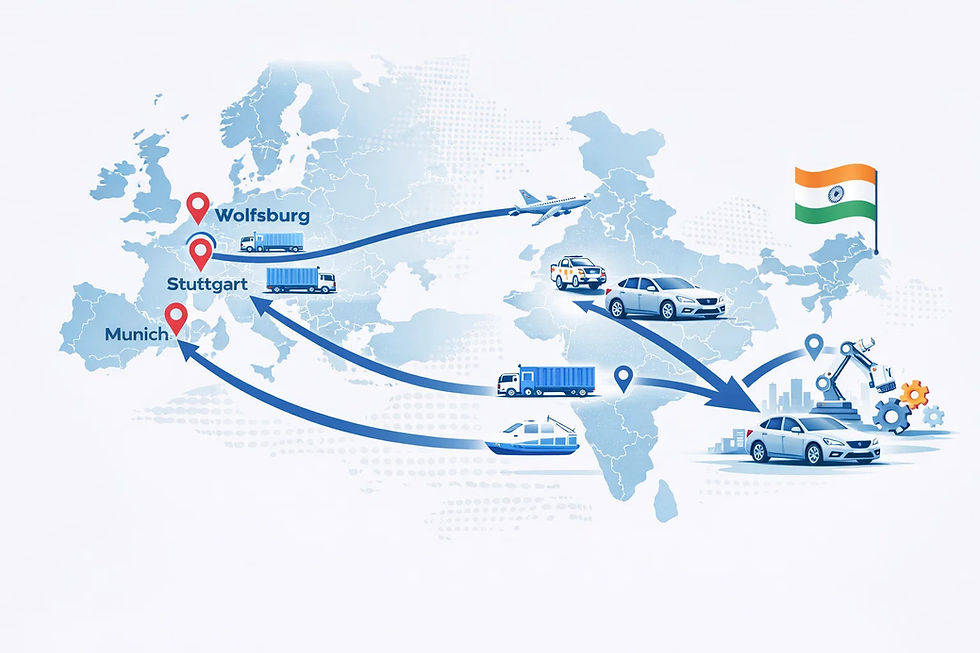India-EU Free Trade Agreement Talks Advance Early Harvest Deal Targeted by July 2025
- News Desk

- May 24, 2025
- 3 min read

In a decisive move to strengthen economic engagement, a high-level Indian delegation arrived in Brussels on 20th May to fast-track negotiations on the long-anticipated India-European Union Free Trade Agreement (FTA). The mission, led by senior officials from India’s Ministry of Commerce and Industry, signaled a renewed urgency and political will from both sides to finalize an “early harvest” agreement by July 2025. This intermediate pact is designed to resolve pressing trade issues while laying the groundwork for a comprehensive FTA by the end of the year.
The delegation’s discussions with EU counterparts are centered around key trade elements including tariff reductions, intellectual property rights, expanded market access, and regulatory alignment. These areas are critical to unlocking the potential of the India-EU economic relationship, which both sides hope will bolster resilience and generate sustainable growth amid a climate of rising global protectionism and shifting geopolitical alliances.
Indian Minister of Commerce and Industry, Shri Piyush Goyal, today met with European Commission Executive Vice President Maroš Šefčovič in Brussels, and held detailed deliberations on critical components of the trade pact. The meeting underscored a mutual commitment to resolve outstanding issues and advance the FTA with a clear objective: to secure tangible outcomes for businesses and consumers on both sides. Minister Goyal stated that the discussions were “productive and forward-looking,” reiterating India’s resolve to pursue a fair and balanced agreement that upholds the principles of equity and mutual benefit.
The early harvest deal is aimed at reaping immediate benefits by focusing on mutually agreeable trade liberalizations, essentially addressing the so-called "low-hanging fruits." By doing so, the interim agreement is expected to build trust, accelerate momentum, and demonstrate tangible gains to stakeholders in both economies. In a quote that underscores the geopolitical relevance of this initiative, officials noted that “the FTA is seen as a strategic move to bolster economic resilience and foster sustainable growth.”
Importantly, this latest round of negotiations comes at a time when both India and the EU are reimagining their trade strategies. The scope of discussions is no longer confined to traditional sectors; instead, there is a marked pivot towards emerging areas such as digital trade, green hydrogen, artificial intelligence, and semiconductors. These forward-looking sectors reflect a shared ambition to lead in the global transition to clean energy and digital transformation.
Minister Goyal, via his official statement on social media, emphasized the strategic dimensions of this collaboration: “Strengthening economic and strategic ties with the EU will help expand our exports, attract investments, and create new opportunities for Indian businesses in critical and emerging technologies.” His message resonated strongly with the broader vision of India positioning itself as a reliable global partner for innovation-driven growth.
Crucially, regulatory harmonization is also on the agenda in Brussels. Aligning standards and certifications could significantly lower non-tariff barriers and improve the ease of doing business across borders. This alignment is viewed as an essential step in deepening economic ties, especially in sectors where regulatory discrepancies have historically impeded growth.
Another pivotal aspect of the ongoing talks involves the services sector, particularly the movement of skilled professionals and data protection protocols. Given India’s dominance in IT and services, enhanced access to the European market could open new avenues for Indian firms, while also meeting the EU’s demand for talent and digital solutions.
According to reports, both sides have expressed optimism about concluding the early harvest agreement by July 2025. With strong political backing and intensified technical negotiations, the pathway to a full-fledged FTA appears more promising than ever. The outcome of these Brussels meetings is being closely monitored by global markets and stakeholders across various sectors.
If successful, the early harvest agreement will mark a significant milestone in India-EU relations and send a powerful signal about the value of collaborative, rules-based trade partnerships. As the July deadline approaches, the next few months will be crucial in shaping what could become one of the most consequential trade agreements for both economies in recent years.




Comments